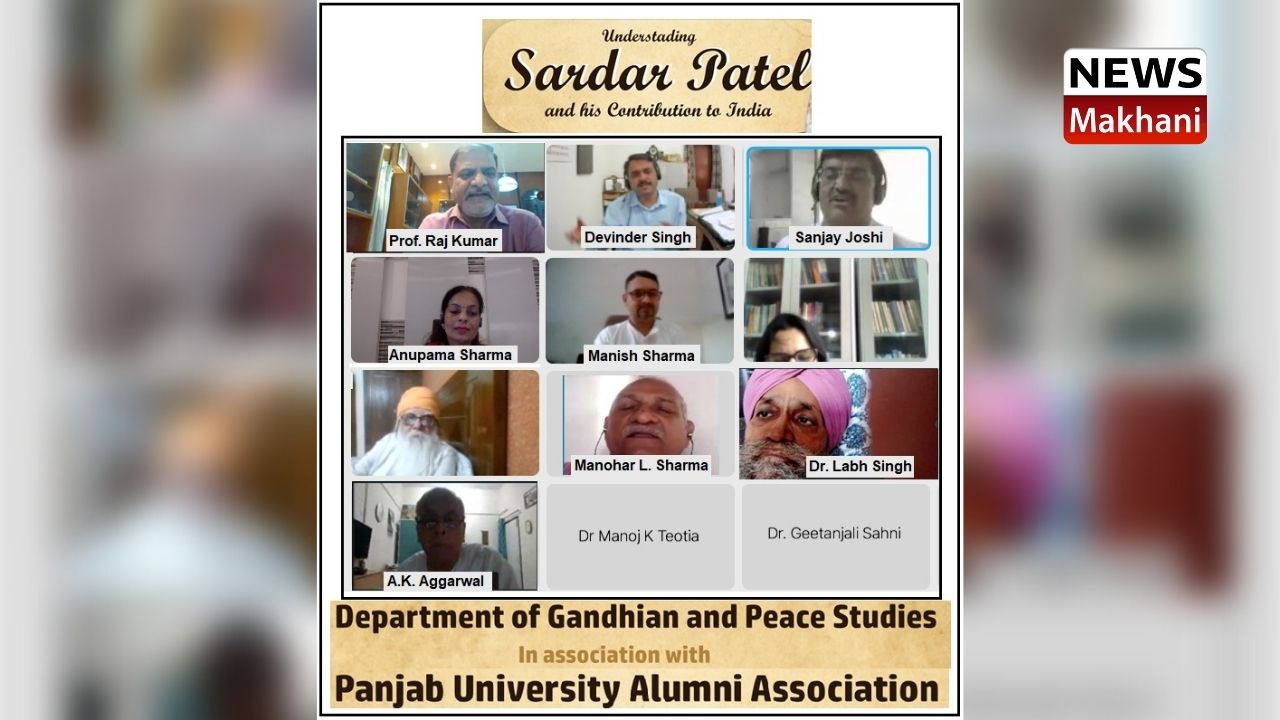Chandigarh September 29, 2021
The Department of Gandhian and Peace Studies in collaboration with Dean, Alumni Association, PU, Interdisciplinary Centre for Swami Vivekananda Studies and Department of Art History and Visual Arts, Panjab University, organized a special lecture on “Understanding Sardar Patel and his contributions to India” by Dr. Sanjay Joshi, Additional Collector, Government of Gujarat and Former Chief Manager of the ‘Statue of Unity’ Presently posted at The Lal Bahadur Shastri National Academy of Administration (LBSNAA), Mussoorie to
celebrate the Jayanti of Mahatma Gandhi from 28th September, 2021 to 2nd October, 2021, today.
READ MORE :-PU VC releases a Book on Intellectual Property
Dr. Sanjay Joshi in his address emphasised that the personality like Sardar Patel is difficult to find in the present times as he lived and died for the masses for their upliftment. He further added that in 1917, Patel found the course of his life changed after having been influenced by Mohandas K. Gandhi. Patel adhered to Gandhi’s satyagraha (policy of nonviolence) in so far as it furthered the Indian struggle against the British. But he did not identify himself with Gandhi’s moral convictions and ideals, and he regarded Gandhi’s emphasis on their universal application as irrelevant to India’s immediate political, economic, and social problems.
Nevertheless, having resolved to follow and support Gandhi, Patel changed his style and appearance. He quit the Gujarat Club, dressed in the white cloth of the Indian peasant, and ate in the Indian manner. His efficient leadership of the Bardoli campaign earned him the title sardar (“leader”), and henceforth he was acknowledged as a nationalist leader throughout India. He was considered practical, decisive, and even ruthless, and the British recognized him as a dangerous enemy. Sardar Vallabhbhai Patel, also worked extensively for the rights of minorities and women, and against untouchability and caste discrimination. Vallabhbhai Patel was instrumental in the creation of the All-India Services which he described as the country’s “Steel Frame”.
Once during his address to the probationers of these services, he asked them to be guided by the spirit of service in day-to-day administration. He reminded them that the ICS was no-longer neither Imperial, nor civil, nor imbued with any spirit of service after Independence. His exhortation to the probationers to maintain utmost impartiality and incorruptibility of administration is as relevant today as it was then. “A civil servant cannot afford to, and must not, take part in politics. Nor must he involve himself in communal wrangles. To depart from the path of rectitude in either of these respects is to debase public service and to lower its dignity,” he had cautioned them on 21 April 1947.He, more than anyone else in post-independence India, realised the crucial role that civil services play in administering a country, in not merely maintaining law and order, but running the institutions that provide the binding cement to a society. He, more than any other contemporary of his, was aware of the needs of a sound, stable administrative structure as the lynchpin of a functioning polity. The present-day all-India administrative services owe their origin to the man’s sagacity and thus he is regarded as Father of modern All India Services.
The online session was presided over by Professor Raj Kumar, Vice Chancellor, Panjab University.He mentioned that Sardar Patel took charge of the States department in July 1947. He sensed the urgent and imperative need of the integration of princely states. He followed an iron handed policy. He made it clear that he did not recognize the right of any state to remain independent and in isolation, within India. Patel also appealed to the patriotic and national sentiments of the Princes and invited them to join the forming of a democratic constitution in the national interest. He persuaded them to surrender defence, foreign affairs and communication to the government of India. Without a civil war, he secured the solidarity of the nation. For his immense contribution towards building of the Indian nation, Sardar Vallabhbhai Patel was posthumously awarded the Bharat Ratna in 1991.The Statue of Unity devoted to Sardar Patel’s act of unifying India stands on the banks of the Narmada river. It is 182m high, making it the tallest in the world. His birthday (October 31st) is celebrated as Rashtriya Ekta Divas (National Unity Day). The country is indebted to him for his selfless service.
Earlier, while welcoming the dignitaries in the webinar, Dr. Manish Sharma, Chairperson of the Department payed his tributes to the Martyrs and introduced the topic and speakers and other invited guests, faculty members and students and informed the gathering that it was because of hard work of Sardar Patel, the reservation for the women was initially started in 1926 with the tough task and fight of 10 years.
In his presidential remarks, Professor Devinder Singh congratulated the Department of Gandhian and Peace Studies and other departments for organizing this webinar and highlighting the untold stories of Sardar Patel .
The event was attended by the senior faculty members of the other departments and other parts of the country also and also by the research scholars and Master students of different departments.
Professor Anupama Sharma, Dean, Alumni Relations proposed the vote of thanks.In the series of events, the next programme will be tomorrow of the ‘Online Painting Competition of the School Students’ of age from 8 years to 12 years and the link for the same is https://meet.google.com/eei-cfxa-fyi

 हिंदी
हिंदी






